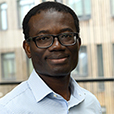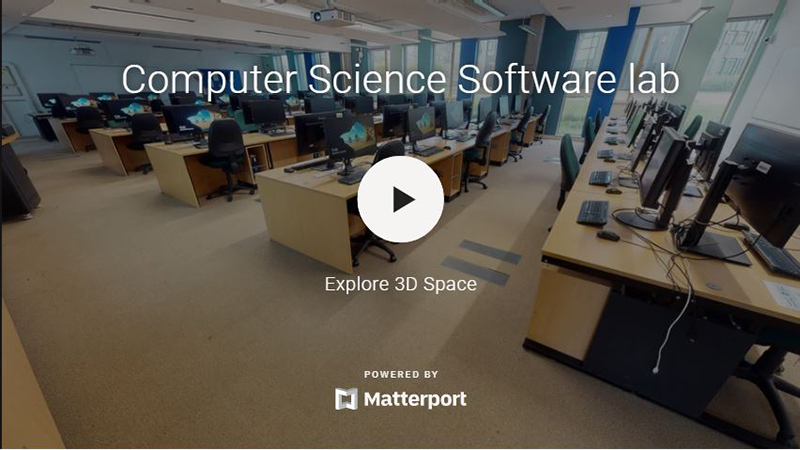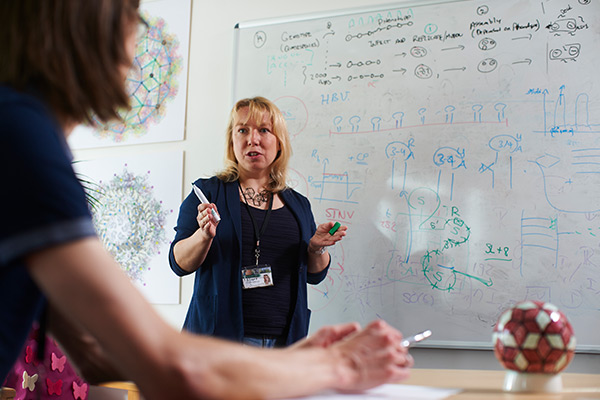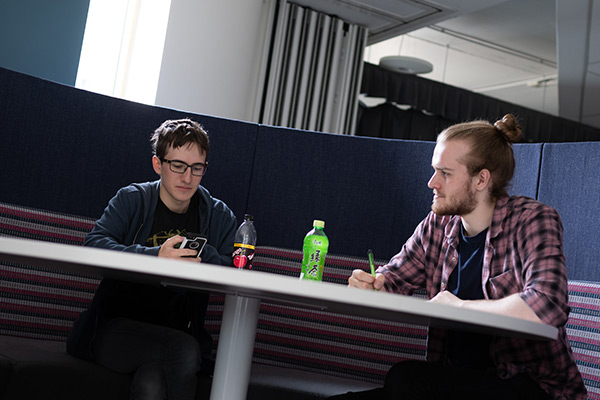View semester dates

BSc (Hons) Computer Science and Mathematics
Study complementary subjects to become fluent in both.
Year of entry: 2026/27
View semester dates
Study both computer science and maths in this combined course. The skills you gain from both disciplines will make you highly employable across a range of sectors.
Computer science is founded upon maths, and the study of the two together allows you to explore topics core to both while gaining an insight into how they intersect.
Maths influences computer science, from designing and analysing efficient computer programs to developing formal proofs that a piece of software does what was intended. This is especially important, for example, if the software is being used to fly a plane.
Increasingly, computer science is also being used to find solutions to mathematical issues. Computers are used to solve long-standing mathematical problems, as they can help visualise complex numerical data, search for solutions, and make number manipulation faster.
Our software labs offer spaces for individual and group work. Software lab virtual tour

The placement team were incredibly helpful. They encouraged us to submit drafts of our CV for feedback. There were also sessions on topics like imposter syndrome and interview skills. These were open to everyone, not just those on the year in industry route, making them a great resource for all students.
Course content
You will gain a thorough grounding in both computer science and maths in your first two years, introducing the fundamental concepts in both subjects while gaining an insight into the interplay between the two. In your final year you can choose to weight your studies towards either subject. Your individual project can be in either subject.
Year 1
Your first year contains essential fundamental material in programming and computer architectures. You will study the mathematical and theoretical foundations of computer science. You will also learn how to increase your employability prospects, including improving your presentation style and exploring the professional issues in computer science.
Core modules
- Software 1: Foundations of Programming for Computer Science
- Foundations and Calculus
- Introduction to Pure Mathematics
- Software 2: Object Oriented Data Structures and Algorithms
- Theory 2: Formal Languages and Automata
- Multivariable Calculus and Matrices
Academic integrity module
In addition to the above you will also need to complete our online Academic Integrity module.
Year 2
Your second year continues teaching you the fundamentals of both disciplines, and more specialist modules start to be introduced.
Core modules
Year 3
In your final year, you can choose to weight your studies more towards Computer Science or Mathematics.
Core modules
Option modules
You will study four option modules. Examples can be found below. Some option module combinations may not be possible. The options available to you will be confirmed after you begin your course.
Computer Science
- AI Search and Logic
- Autonomous Robots
- Computer Vision and Graphics
- Cryptography Theory and Practice
- Embedded Systems Design and Implementation
- Engineering 2: Automated Software Engineering
- Ethical Hacking, Analysis and Investigation
- Evolutionary Intelligence
- High-Integrity Systems Engineering
- High-Performance Parallel and Distributed Systems
- Intelligent Systems: Probabilistic and Deep Learning
- Legal Practice, Technology and Computer Science
- Network Security
- Qualitative Approaches to Investigating UX
- Quantum Computation
Mathematics
- Cryptography
- Differential Geometry
- Groups, Actions and Galois Theory
- Measure and Integration
- Metric Spaces
- Number Theory
- Numerical Analysis
- Operations Research
- Topology
Elective modules
You may be able to replace one option module with an elective module, studying a complementary subject, a language or an interdisciplinary topic.
Our modules may change to reflect the latest academic thinking and expertise of our staff, and in line with Department/School academic planning.
Learning outcomes
Every course at York has been designed to provide clear and ambitious learning outcomes. These learning outcomes give you an understanding of what you will be able to do at the end of the course. We develop each course by designing modules that grow your abilities towards the learning outcomes and help you to explain what you can offer to employers. Find out more about our approach to teaching and learning.
Learning outcomes for this course
- Confidently and competently apply computational and mathematical thinking to problems, using skills in problem analysis, representation and abstraction, and the application of standard mathematical and computational techniques, including the theory and practice of programming and software engineering.
- Critically analyse statements, arguments or conjectures that underpin the theory of Mathematics and Computer Science, and justify the principles chosen for such critiques.
- Adapt to new and unfamiliar challenges in Computer Science and Mathematics, recognising appropriate ideas and approaches drawn from a range of technologies, languages, paradigms, models and mathematical theories.
- Conduct an independent investigation into a specialised area of Mathematics or Computer Science, by gathering material from a variety of sources, and synthesising this material into a well-organised and coherent account, or effective solution to a user-specified need.
- Work effectively in a team, formulating and fulfilling obligations towards achieving goals by managing workloads, setting and meeting deadlines, and optimising resources.
- Communicate complex ideas in Computer Science and Mathematics in a clear and organised manner, at a level appropriate for the intended recipients, and also present an effective summary of these ideas.
- Appreciate the wider context of Mathematics and Computer Science and their individual components, develop an awareness of issues such as information security and system reliability.
Fees and funding
The fees and funding information here is for students starting in the 2026/27 academic year.
If you take a year abroad or year in industry you'll pay a reduced rate of fees for that year.
Annual tuition fees
| UK (home) | International and EU |
|---|---|
| £9,535 (TBC) | £32,350 |
The UK government has announced its intention to increase tuition fees from £9,535 to £9,790 for the 2026/27 academic year. We expect this to apply to new UK (home) undergraduate students starting their studies in September 2026.
UK (home) or international fees?
The level of fee that you will be asked to pay depends on whether you're classed as a UK (home) or international student. Check your fee status.
Fees for subsequent years
- UK (home) fees may increase within the government fee cap in subsequent academic years. We will notify you of any increase as soon as we can.
- International fees are subject to increase in subsequent years in line with the prevailing Consumer Price Index (CPI) inflation rate (up to a maximum of 10%).
More information
For more information about tuition fees, any reduced fees for study abroad and work placement years, scholarships, tuition fee loans, maintenance loans and living costs see undergraduate fees and funding.
Additional costs
There are unlikely to be any mandatory additional costs associated with the course, although you may want to set aside £200 for optional photocopying and personal stationery over the duration of the course.
Funding
We'll confirm more funding opportunities for students joining us in 2026/27 throughout the year.

The department is always making us aware of the different careers opportunities that are available to us so that we can further improve our employability. In particular, our careers officer sends weekly emails with current internships, volunteering and summer schools that are on offer. This has been very beneficial because it is difficult to know what direction to take in my future.
York, Oxford, Cambridge, Imperial
Just four UK universities are rated Gold for teaching and top ten for research* in the latest national assessment exercises.
* Awarded joint 10th in the Times Higher Education ranking of the Research Excellence Framework 2021.
Teaching and assessment
You’ll study and learn with academics who are active researchers, experts in their field and have a passion for their subjects. Our approach to teaching will provide you with the knowledge, opportunities, and support you need to grow and succeed in a global workplace. Find out more about our approach to teaching and learning.
Teaching format
A typical week will involve about 10-15 hours of scheduled teaching time. Our courses are based on a series of one-hour lectures with associated laboratory sessions, programming classes and tutorials.
Throughout the course, you will have a personal supervisor responsible for guiding your studies. In addition to any timetabled sessions, you will meet with your supervisor regularly, and you can also go to them at any time should you have any issues, academic or personal. There are problem classes to help you put learning from lectures into practice and weekly one-to-one project supervisions in your final year.
You will also undertake learning outside of the scheduled timetable. This can be through working in the labs, through reading recommended materials or by working through problems. Consequently, you'll need to be self-motivated, self-disciplined and willing to learn outside regular classes.
As you progress through the course you will develop your skills to become a more independent learner. You'll also spend time working on your individual research project later on in the course, in addition to timetabled activity; you will be allocated a project supervisor, with whom you will have regular meetings in addition to timetabled sessions. You can go to your supervisor for support and advice regarding your project.
Timetabled activities
In your first year, you can expect:
| Lectures | 4-6 hours per week |
|---|---|
| Tutorials | 0-2 hours per week |
| Problem classes | 2-4 hours per week |
| Workshops | 0-2 hour per week |
| Practicals | 3-6 hours per week |
| Optional activities | 0-3 hours per week |
These figures are representative of a typical week. Your contact hours will vary throughout the year due to your module choices, non-compulsory classes, exam periods and changes to scheduled activities.
Outside your timetabled hours, you'll study independently. This may include preparation for classes, follow-up work, wider reading, practice completion of assessment tasks, or revision.
In the UK, full-time students are expected to spend 1,200 hours a year learning. That's about 40 hours of classes and independent study each week during semesters. Everyone learns at a different rate, so the number of hours you spend on independent study will be different to other students on your course.
Facilities
Built to the highest specifications, the Department of Computer Science is packed with cutting-edge facilities housed in a modern, self-contained building.
Computer Science houses four software and two hardware laboratories which you will be able to use depending on the topic of your third year project. These facilities are professional grade and used by our research teams so, depending on your interests, you'll get first hand exposure to these environments.
The Department of Mathematics is a community of mathematicians from all over the world, engaged in world-class research and committed to excellence in teaching with a special emphasis on small groups and a friendly atmosphere.
Both departments are based in the Ian Wand Building on Campus East.
Teaching location
Teaching will take place predominantly on Campus East (home to the Department of Computer Science and the Department of Mathematics).
About our campus
Our beautiful green campus offers a student-friendly setting in which to live and study, within easy reach of the action in the city centre. It's easy to get around - everything is within walking or pedalling distance, or you can use the fast and frequent bus service. Take a campus tour.
Assessment and feedback
We use a variety of assessment techniques throughout your course. This allows you to practice different techniques, from report writing, presentations and live demos to timed programming assessments and closed exams. It also means that you are not disadvantaged by being assessed in any one way.
To aid your learning we provide feedback on your assessments in addition to the marks you receive.
We ask our students for feedback on the course at the end of each year. This helps to improve and modify what we do to help meet the needs of our students.
Careers and skills
The move towards a digital economy creates demand for computer scientists and software engineers across a broad section of employers, so the skills you develop here will make you attractive to many organisations.
Many of our graduates are employed by software and electronics industries, but the continuing expansion of the use of computers in commercial and financial operations means that you will be able to find employment in other industries - and here your sharpened numeracy and analytical skills will have prepared you well.
Career opportunities
- Computer programmer
- Software engineer
- Software developer
- Business analyst
- Research scientist
- Network manager
- IT Systems manager
- Banking and financial services
- Computing and IT
- Law
- Engineering
- Logistics
- Telecommunications
Transferable skills
- Analytical skills
- Research skills
- Management skills
- Communication skills
Entry requirements
| Qualification | Typical offer |
|---|---|
| A levels | AAA including Mathematics. If you are studying towards a fourth A level, we will make an alternative offer of AABB including grade A in Mathematics. |
| Access to Higher Education Diploma | We accept the Access to Higher Education Diploma. The syllabus must contain a significant portion of Mathematics that is considered equivalent to A level standard. Applications will be considered on an individual basis - please contact the Department before you apply. |
| BTEC National Extended Diploma | DDD and grade A in A level Mathematics (or equivalent qualification). We consider applicants with a combination of other BTEC Level 3 qualifications, and this must include a grade A in A level Mathematics (or equivalent qualification). Please contact us to discuss your combination of qualifications. |
| European Baccalaureate | 85% overall, including 85% in Mathematics |
| International Baccalaureate | 36 points overall, including grade 6 in Higher Level Mathematics (either Analysis and Approaches or Applications and Interpretations). |
| T levels | We are currently not accepting T Levels for this course unless an additional A Level (or equivalent qualification) in Mathematics has been taken. |
| Scottish Highers / Advanced Highers | Advanced Highers - A in Mathematics plus Scottish Highers - BBBB We may also be able to consider three Advanced Highers or a combination of Highers and Advanced Highers, where an applicant does not meet the grade requirement through Highers alone. Please contact us to discuss your qualifications. |
| International foundation programme | Foundation Certificate from our International Pathway College or an appropriate alternative. |
| Other qualifications | We welcome applications offering a mix of OU, A level and other appropriate qualifications. Applications will be considered on an individual basis: please contact the Department before you apply. |
| Other international qualifications | Equivalent qualifications from your country |
Alternative offers
Meeting the following additional criteria may qualify you for an alternative offer.
| Criteria | Adjustment |
|---|---|
| Widening participation | ABC including A in Mathematics This is conditional upon successful completion of the WP programme including the YorJourney module (Black Access Programme, Next Step York) or successful completion of Realising Opportunities More about widening participation. |
| Contextual offer | ABB including grade A in Mathematics. |
| EPQ | If you achieve A or higher in the EPQ, you may be eligible for an alternative offer up to one A level grade (or equivalent) below our typical offer. |
English language
If English isn't your first language you may need to provide evidence of your English language ability. We accept the following qualifications:
| Qualification | Minimum requirement |
|---|---|
| IELTS (Academic) | 6.5, with a minimum of 6.0 in each component |
| IB English | A score of 4 in English A or 5 in English B (Higher Level or Standard Level) |
| Cambridge CEFR | 176, with a minimum of 169 in each component |
| Oxford ELLT | 7, with a minimum of 6 in each component |
| Oxford Test of English Advanced | 136, with a minimum of 126 in each component |
| Duolingo | Integrated subscores: 120 overall, with a minimum of 105 in each component |
| GCSE/IGCSE/O level English Language (as a first or second language) | Grade C / Grade 4 |
| LanguageCert SELT | B2 with a minimum score of 33/50 in each component |
| LanguageCert Academic | B2 with a minimum score of 33/50 in each component |
| Kaplan Test of English Language | 478 Main Flight score with 444 in each component |
| Skills for English | B2: Merit overall, with Pass with Merit in each component |
| PTE Academic | 61, with a minimum of 55 in each component |
| TOEFL | 87 overall, with a minimum of 21 in each component (taken before January 2026) 4.5 with 5 in Listening and 4.5 in each other component (taken after January 2026) |
| Trinity ISE III | Merit in all components |
| Other English language qualifications | We also accept other English Language qualifications, including various school-leaving certificates. |
For more information see our undergraduate English language requirements.
If you haven't met our English language requirements
You may be eligible for one of our pre-sessional English language courses. These courses will provide you with the level of English needed to meet the conditions of your offer.
The length of course you need to take depends on your current English language test scores and how much you need to improve to reach our English language requirements.
After you've accepted your offer to study at York, we'll confirm which pre-sessional course you should apply to via You@York.
Next steps
Contact us
Get in touch if you have any questions

Discover York









